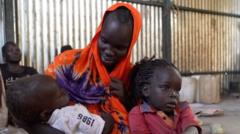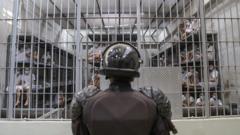With over 80,000 Afghans leaving Pakistan amid an impending deadline, mass deportations highlight the struggles faced by those who have known no other home. Border officials and Afghan returnees share the emotional toll and logistical challenges tied to this ongoing crisis.
Mass Deportations Reshape Afghan Lives as Pakistan Tightens Borders

Mass Deportations Reshape Afghan Lives as Pakistan Tightens Borders
Over 19,500 Afghans are expelled from Pakistan this month, raising concerns for those forced to return to a war-torn homeland under Taliban rule.
In a rapid escalation of border policies, Pakistan has deported more than 19,500 Afghans this month, part of a larger initiative to expel over 80,000 individuals ahead of a looming 30 April deadline, as reported by the UN. Citing pressures on public services and national security, Pakistan has intensified its efforts to remove both undocumented migrants and those with temporary residency permits. The Taliban government anticipates that this number could increase to two million in the coming months, as families face the uncertain prospect of returning to Afghanistan.
On the ground at the Torkham border crossing, around 700-800 families are reportedly being sent back each day. During a visit to Kabul, Pakistani Foreign Minister Ishaq Dar met with Taliban officials—including Amir Khan Muttaqi—who voiced deep concern over the ongoing deportations. For many returning Afghans, this marks a homecoming to a country they barely recognize.
Urging the right to education amidst their predicament, individuals like Saleh, a father of three daughters, lament the stark contrast between their children's access to schooling in Pakistan and the new barriers under Taliban governance where girls over the age of 12 cannot attend school. Others echoed the fear of an uncertain future, having spent their lives in Pakistan only to face a sudden, forced relocation.
Conditions at the border remain tense, characterized by separation and scarcity amid sweltering heat. Refugees, many of whom are elderly or unwell, are left with minimal provisions as Pakistani and Afghan guards oversee the process. Reports indicate that families arriving from various regions of Afghanistan can expect to receive small sums of financial aid to help with their re-establishment, yet the burden on Afghanistan's already fragile infrastructure is palpable.
The ongoing mass deportations have sparked outrage, fueling concerns from international human rights organizations. Yet, Pakistan's government has denied claims that refugees are being barred from taking essential belongings back with them. The situation continues to evolve as pressures mount on both nations involved in this humanitarian crisis, leaving many Afghans grasping for hope in an increasingly hostile environment.



















